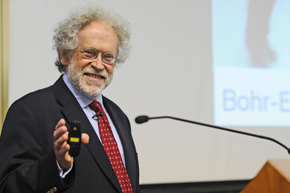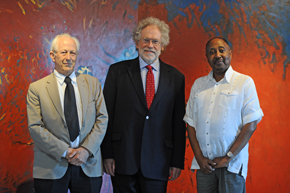Physicist casts light on randomness
27 October 2011 | Story by NewsroomConsider a very simple experiment involving some light and a mirror. Half the light goes through the mirror while the other half is reflected. Remember, further, that light consists of particles.

|

|
| Keeping track: Prof Anton Zeilinger entertained and informed a UCT audience about quantum physics. | Welcome: Prof Anton Zielinger (middle) is welcomed to UCT by Emer Prof George Ellis (left) and deputy vice-chancellor Prof Thandabantu Nhlapo. |
So what, then, determines which light particles will be reflected and which will be transmitted?
The answer, according to world-renowned physicist Professor Anton Zeilinger, is that it is entirely random: You will only know which particles were reflected and which went through the mirror only after the fact - and you can detect with a special apparatus which particles got through and which were reflected.
This fundamental insight into quantum randomness, Zeilinger explained, was the subject of a profound difference of opinion and landmark public debate between two of the greatest scientists of the last century - Albert Einstein and Niels Bohr.
"Einsten would not accept that anything was random. He is quoted as saying: 'God does not play dice '¦', prompting Bohr's response: 'Who are you to tell God how to run her business,' Zeilinger joked to the well-attended seventh and final Vice-Chancellor's Open Lecture of the year on Tuesday, 25 October.
Zeilinger is professor of physics at the University of Vienna, Austria, and director of the Vienna branch of the Institute for Quantum Optics and Quantum Information at the Austrian Academy of Sciences.
In his address, titled Quantum Games and Quantum Information, he described how quantum physics provides possibilities to win betting games that are otherwise impossible to win. These are related to the questions of the nature of reality and information in a quantum context.
He outlined some of the fundamental debates in quantum physics over the past century, and described how quantum physics was only referred to once in the 10 years that followed the initial debate - and once or twice in the next 10 years - but interest has taken off exponentially in the subject. No less than 500 scientific papers referring to quantum physics by name were published over the past decade.
Zeilinger, who in 2005 was named by leading British current affairs magazine New Statesman as one of the "10 people who could change the world", is also renowned for his realisation of quantum teleportation - moving a basic unit of quantum information, i.e. a qubit, from one location to another without the qubit ever being transmitted through the in-between space - with photons.
In the late 1980s, he focused on quantum entanglement, which resulted in his most significant results and opened up new fields of quantum teleportation, quantum information, quantum communication and quantum cryptography. Along with Daniel Greenberger and Michael Horne, he wrote the first paper on entanglement between two particles. The trio's GHZ Theorem - describing what's known as Greenberger-Horne-Zeilinger states - is fundamental to quantum physics.
In his lecture, Zeilinger discussed some basic experiments and their interpretations, as well as the application of the fundamental concepts in the newly emerging field of quantum information science.
Back to the experiment with the mirror, which best illustrates quantum randomness: Zeilinger explained how quantum mechanics tells us that after having "met" the mirror, the particle is in the "super-position" of being reflected or going through. "So [we don't] know yet what has happened ' and [we don't] know what has happened [until we put a detector there, which clicks when the particle arrives].
"There is no way of predicting whether the particle will go through or be reflected. You will only know when it has happened and you can determine what has happened by way of an instrument that will detect that the particle has gone through or been reflected," he elaborated.
"What we have is objective randomness for individual events to happen. There is no cause. I like to provoke my Catholic friends by saying that not even God knows what will happen," he said.
It was originally thought, he added, that this randomness of particle behaviour operated only on the micro scale within atoms. But, he explained, it has since been established that it functions on the macro scale as well, and that it can be determined over huge distances.
This, he explained, has been established in a recent experiment over 144km between two Canary Islands, resulting in a successful demonstration that quantum communication with satellites is feasible.
Zeilinger demonstrated how these advances in quantum physics are not only theoretical, but have given rise to the possibility for huge technical advances in science and application in the real world. It even opens the possibility for creating a computer that will be able to answer any question it is asked.
Another possibility is the encryption of messages so that eavesdropping on an electronically transmitted message, an email, for example, will be impossible because the encryption will be infinitely random.
Zeilinger's address prompted a lively discussion from questioners, including a question on how to isolate a particular photon - and on the existence of God.
"Physics can neither prove or disprove the existence of God. Some of my friends tell me my work can prove the existence of God. But you cannot want that because that would be the end of all religion. Then religion would be a logical consequence of science. There would be no belief anymore."
Download the podcast of the lecture.
 This work is licensed under a Creative Commons Attribution-NoDerivatives 4.0 International License.
This work is licensed under a Creative Commons Attribution-NoDerivatives 4.0 International License.
Please view the republishing articles page for more information.










